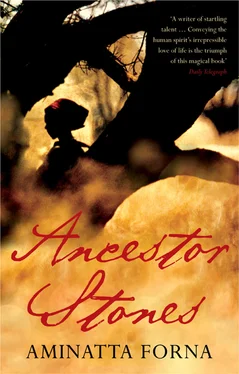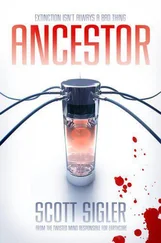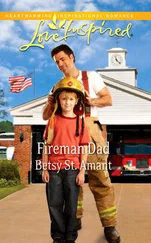In their neat and shining homes, people settled down to wait. And waited. And waited. And just as they were beginning to wonder how much longer we might have to wait, to fear our leader was just a pretty face with a silver tongue, he was toppled by another young man with equally babyish features though he was not quite as silver-tongued. So that when, in a tarnished voice, he announced we were to have elections for the first time in many years few believed it, and many didn’t hear at all because they had given up listening a long, long time ago.
A Monday. The year, 1996. I was in my late fifties.
I stood before my reflection in the mirror on my wardrobe, watching my own movements in the half-light. No electricity for three days running. The clothes I had put out the night before hung from the door: a trouser suit in pale blue linen. I discarded it and instead chose an orange-gold gown embroidered at the sleeves and around the neck. In the dimness of the morning I made up my face, applying the brushstrokes from memory: foundation, powder, lipstick, mascara. Then I slipped the gown over my head. From the shoe rack on the back of the door I chose a pair of gold shoes to match the gown, with open toes and high heels and a strap that encircled my ankle, bought from Bally of Bond Street. I slipped gold bangles on to my wrists, clasped a necklace around my neck and hooked earrings in the lobes of my ears.
Since the early hours angry sounds had rolled over the city. Sounds like thunder from the direction of the Army base on the hill. A booming and the spit and crack of lightning. But in the morning, no sign of a storm, nothing to be seen at all, only a light dew on the ground that soon transformed itself into pale, curling vapours and vanished in the heat of the day.
In the lane a single hawker called his wares outside houses that were still in darkness. Silence everywhere. No car horns, no chatter of schoolchildren. Most schools were closed for the day. The corridors and classrooms of those that remained open were empty, as parents kept their children at home. A pair of dogs scrapping, a cockerel trumpeting: these were the only sounds.
From the verandah I looked out over the street. A woman emerged from a house and threw a pan of dirty water into the road, ducked back inside without once looking over or offering a greeting. A rumbling, growing in the distance. An Army truck loaded with soldiers rolled past the junction swiftly on out of sight.
At seven o’ clock when it was light I sat down to breakfast with Yaya. The bread was stale. No point sending out for a fresh loaf, the Fula shops would certainly be shut. I spread a slice with margarine and chewed a mouthful but, though I drank a glass of water, my mouth was so dry swallowing was impossible. The hunger was gone, replaced in my stomach by a tight, hard ball. I made a cup of instant coffee with the water in the Thermos and sipped at it. Its empty, bitter taste was all I wanted.
‘Are you still going?’ Yaya asked me.
‘Yes,’ I said, but a few dry crumbs caught in my throat and through them the word came out fluttering and small. I cleared my throat and coughed.
‘Yes,’ again. This time the sound of my own voice convinced me a little.
We waited together in silence, not in our usual companionable silence, but a taut stillness in which every sound echoed and reverberated.
The members of the women’s volunteer group had been told a car would be sent to pick us up. It never came. I wasn’t surprised at that. I gave the driver twenty minutes more, then I went to the telephone and dialled the number of the next woman. The receiver hissed faintly with static, the sound of the numbers clicking through, but again and again the call failed to connect. On the other side of the room Yaya fiddled with the knob of the transistor radio. There was none of the usual morning chatter, the endless announcements of births, deaths and marriages, the wishing of luck for exams, congratulations for scholarships, jingles for Mazola oil and Eveready batteries and Bennimix baby food. The dial passed station after silent station, like empty bus stops.
The crackling again. Once, twice. This time from somewhere in the distance. Followed by the thunder of another truck. I crossed the room to look outside. Yaya called to me to stay away from the windows. I pressed my back to the wall and moved the curtain a fraction. Another truck, also full of soldiers, standing waving their guns in the air, singing songs as though they were on their way to a football match.
From the radio a single voice rang out. It made me jump. That’s how nervous I was; my heart felt like a trapped animal trying to claw its way out of a cage. A woman’s voice, expressionless and staccato as an untrained actress reading somebody else’s lines, announced the streets were calm, the polls had opened and people were beginning to vote. The elections were under way.
But the polls couldn’t be open. It was impossible.
Rofathane. The village was all but encircled by a river that was a wide stream in some places and a deep channel in others: in many ways the place I grew up was almost an island. The path to the playing fields was crossed by means of a footbridge: the slender, swaying trunk of a single palm tree that rested between one bank and the other, spanning the swirling waters.
My mother taught me to cross that bridge and at the same time she also taught me how to master my own fear.
By that time Yaya had taken my place on my mother’s back, but was still too small to play with. I used to tag along behind the older children and one day followed them on their way to the playing fields. But when we reached the bridge I stopped, too frightened to go any further. Instead I stood on the opposite bank, listening to the screams and chatter fade away, watching the water rise and fall, seeing myself already plummeting down and disappearing into a whirlpool.
The next time I came to cross the bridge I was with my mother. As soon as we neared it I clung on to her hand and dug my heels into the earth. My mother was unmoved. She picked me up and set me on the bridge, holding on to me lightly from behind.
‘Look straight ahead,’ she told me. ‘Don’t look back. And never look down. I’ll be right behind you.’ And with that she let me go.
I dared not disobey my mother, so although my knees trembled I did as she bade me, and when in midstream I wavered she prompted me. ‘One foot in front of the other. Don’t think about anything else, just look where you’re going.’
Urged on by her gentle certainty I summoned my courage up from the inside. And as the years went by, in this simple way I learned to have power over my own fear.
I had forgotten that time. But that morning, after I listened to the words being spoken on the radio, I walked to the gate of the yard. My mind was set, I looked straight ahead, I ignored the little knot of fear rolling around in the empty hollow of my stomach.
Yaya came with me to the gate. The look on his face told me he would have tried to persuade me to stay at home. But the look on mine told him I was determined to go. My look won. My brother put his hands on my shoulders, kissed me on each cheek and watched in silence as I started walking down the empty street.
I dug into my handbag until I found the laminated badge and pinned it to my chest. I placed one foot in front of the other, I kept my eyes fixed straight ahead, I refused to think of the danger. One street later I banged on the iron gates of Redempta’s house. She was ready, waiting for me. Never doubted that I would come, she told me later. I waited a moment while she fixed her badge to her chest. We looked at each other, we laughed because fear hates the sound of laughter. And we walked on.
Had anyone else been in the streets that morning they would have seen two middle-aged women, out for a stroll in the early light. But the words pinned to our bosoms told a different story: ‘Returning Officer. Presidential Elections 1996.’
Читать дальше












